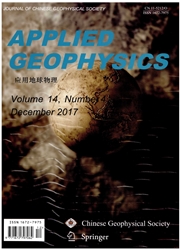

 中文摘要:
中文摘要:
本文提出了一种基于自适应分子分解的地层吸收补偿方法。该方法能有效克服时频域地层吸收补偿方法中局部分析时窗端点反射子波截断和窗内子波重叠干涉对补偿效果带来的影响。该方法具体实现如下:首先根据地震信号振幅谱的时变特性,构造一组自适应分子标架,将地震信号变换到时频域;然后在时频域提取每个时窗内地震信号振幅谱的慢变分量(时变子波振幅谱);再在每个时窗内,利用相关系数构造目标函数,反演吸收补偿滤波器参数,得到吸收补偿滤波器;接着用吸收补偿滤波器对各时窗内信号的时频谱进行补偿,最后重构补偿后的时频系数,得到补偿后的地震记录。自适应分子分解的引入,使得本文方法可用于含有薄层(或薄互层)的非均匀粘弹性介质反射地震记录的地层吸收补偿。文中给出了模型及实际资料算例,验证了本文提出的方法的有效性。
 英文摘要:
英文摘要:
In this paper,we present a new method for seismic stratigraphic absorption compensation based on the adaptive molecular decomposition.Using this method,we can remove most of the effects resulting from wavelets truncation and interference which usually exist in the common time-frequency absorption compensation method.Based on the assumption that the amplitude spectrum of the source wavelet is smooth,we first construct a set of adaptive Gabor frames based on the time-variant properties of the seismic signal to transform the signal into the time-frequency domain and then extract the slowly varying component(the wavelet's time-varying amplitude spectrum) in each window in the timefrequency domain.Then we invert the absorption compensation filter parameters with an objective function defined using the correlation coefficients in each window to get the corresponding compensation filters.Finally,we use these filters to compensate the timefrequency spectrum in each window and then transform the time-frequency spectrum to the time domain to obtain the absorption-compensated signal.By using adaptive molecular decomposition,this method can adapt to isolated and overlapped seismic signals from the complex layers in the inhomogeneous viscoelastic medium.The viability of the method is verified by synthetic and real data sets.
 同期刊论文项目
同期刊论文项目
 同项目期刊论文
同项目期刊论文
 High-dimensional Waveform Inversion with Cooperative Coevolutionary Differential Evolution Algorithm
High-dimensional Waveform Inversion with Cooperative Coevolutionary Differential Evolution Algorithm ESTIMATION OF QUALITY FACTOR Q FROM THE INSTANTANEOUS FREQUENCY AT THE ENVELOPE PEAK OF A SEISMIC SI
ESTIMATION OF QUALITY FACTOR Q FROM THE INSTANTANEOUS FREQUENCY AT THE ENVELOPE PEAK OF A SEISMIC SI 期刊信息
期刊信息
